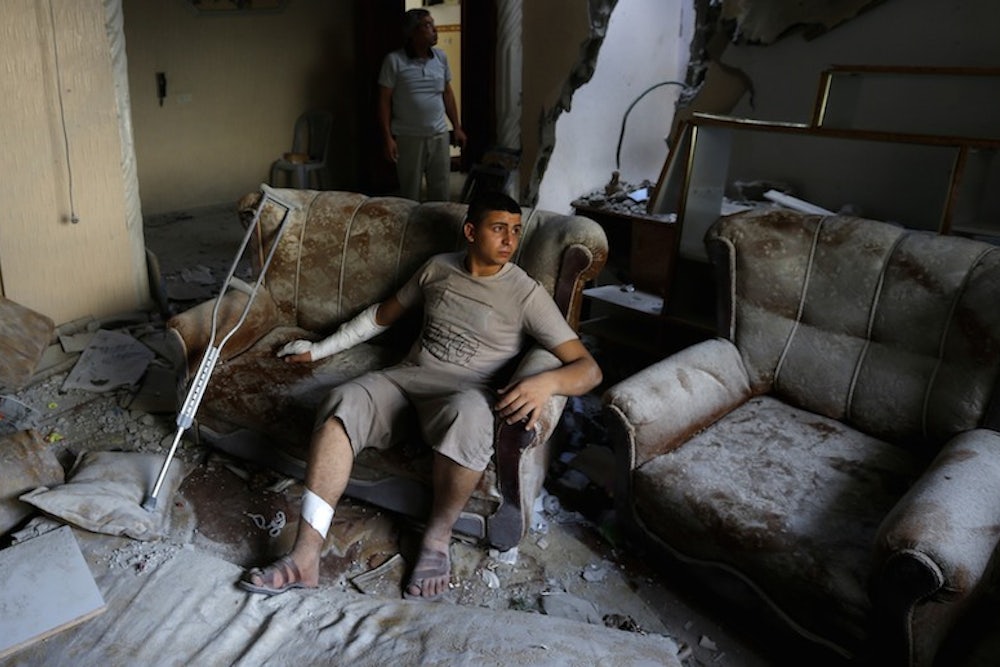The skies over Gaza and Israel are free of rockets and fighter jets for now, as negotiators meet during another tenuous Egyptian-sponsored ceasefire. According to news accounts Tuesday, the negotiations are not going well. But given the goals of the two sides, both short term and long term, this impasse should surprise no one.
After launching a lengthy rocket campaign against Israeli cities and triggering a devastating Israeli response, Hamas is desperate to demonstrate some sort of concrete gain so that it can convince Palestinians that its violent strategy is worth its catastrophic costs. Hamas is also desperate to open a route for rearmament, now that its rocket supply is depleted and its tunnel network bulldozed. That's why the group has made a weakening of the Israeli blockade its prime immediate goal. For its part, Israel is determined to deny Hamas a strategic victory that would legitimate its violent strategy and weaken the more moderate Palestinian Authority. And most importantly, Israel insists that a release of its blockade be accompanied by enforceable measures for the demilitarization of Gaza.
Given the incompatibility of the sides’ respective goals, it’s clear that negotiations are a bit of a farce. In the short term, Hamas seeks an arrangement that expands its legitimacy at the expense of the Palestinian Authority; Israel seeks to weaken Hamas and enhance the authority of the Palestinian Authority. Hamas seeks rearmament; Israel seeks demilitarization. In the long term, Hamas seeks Israel’s dissolution and replacement with an Islamist state. Israel seeks a reliable normalcy for its citizens, and is currently deeply divided over whether it wants, needs, or can even afford the creation of a Palestinian State. These objectives are simply not reconcilable.
The question, then, is who will blink first. Will the misery of constant rocket fire and international horror at the costs to Gazan civilians force Israel to weaken the blockade without mechanisms for demilitarization? Or will ongoing damage to Hamas’ infrastructure, the decimation of its ranks and the depletion of its weaponry force it to consent to an acceptable degree of disarmament?
The current 72-hour ceasefire is shaky and unsustainable. For Hamas, simply holding its fire much longer would amount to an acceptance of the status quo of over a month ago. At that point, its political isolation, plummeting popularity, and dire financial situation motivated its desperate launch of missiles and the initiation of the current round of bloodshed. Returning to such a situation—with a bump in popularity but with severely degraded operational capabilities—is simply a result Hamas cannot afford. So if talks really do go nowhere we can expect another conflagration. Within hours, a barrage of Hamas rockets will be met again with a campaign of Israeli air strikes.
But even with an unsustainable status quo, the zero sum nature of Hamas’ and Israel’s goals will likely prevent either side from blinking. Despite the asymmetry of their lethal power, neither Israel nor Hamas has the capability of imposing its desired result on the other. Hamas rockets cannot force open a blockade, nor end the Israeli state. Even a full-scale Israeli reoccupation and forced demilitarization of Gaza would be prohibitively costly, and it would bring only temporary calm, not lasting peace.
Instead, both sides will likely resign themselves to some sort of renewed modus vivendi that is only slightly less terrible than the status quo. Israel and Hamas will agree to a partial weakening of the blockade in exchange for a nominal effort at demilitarization. There will be ineffectual international observers and a limited role for PA officials. The terms will be vague and weak enough to allow Hamas to retain its weapons, rebuild some of its infrastructure and hold onto power over Gazan society. But they will also be abstract and amorphous enough to allow Israel to maintain restrictions on goods into Gaza and at least slow Hamas’ rearmament. Both sides will grudgingly declare victory and grow ever more furious as they count the ways in which the other side has failed to live up to its obligations. Without a realignment of Palestinians around a peaceful and functional leadership, and without a less risk-averse Israeli approach to final status talks with the PA, war will return. If not next year, then in the next five.
